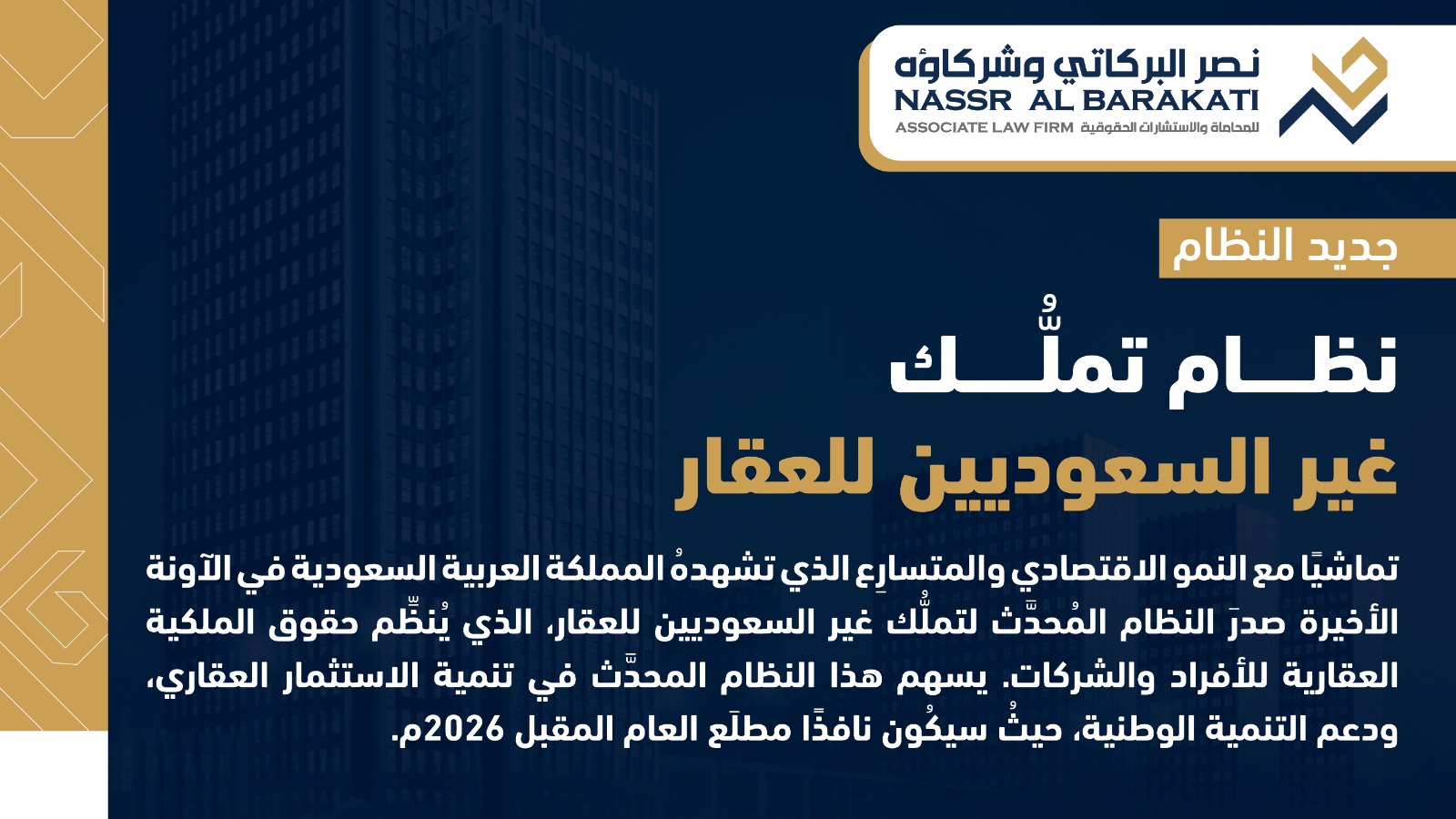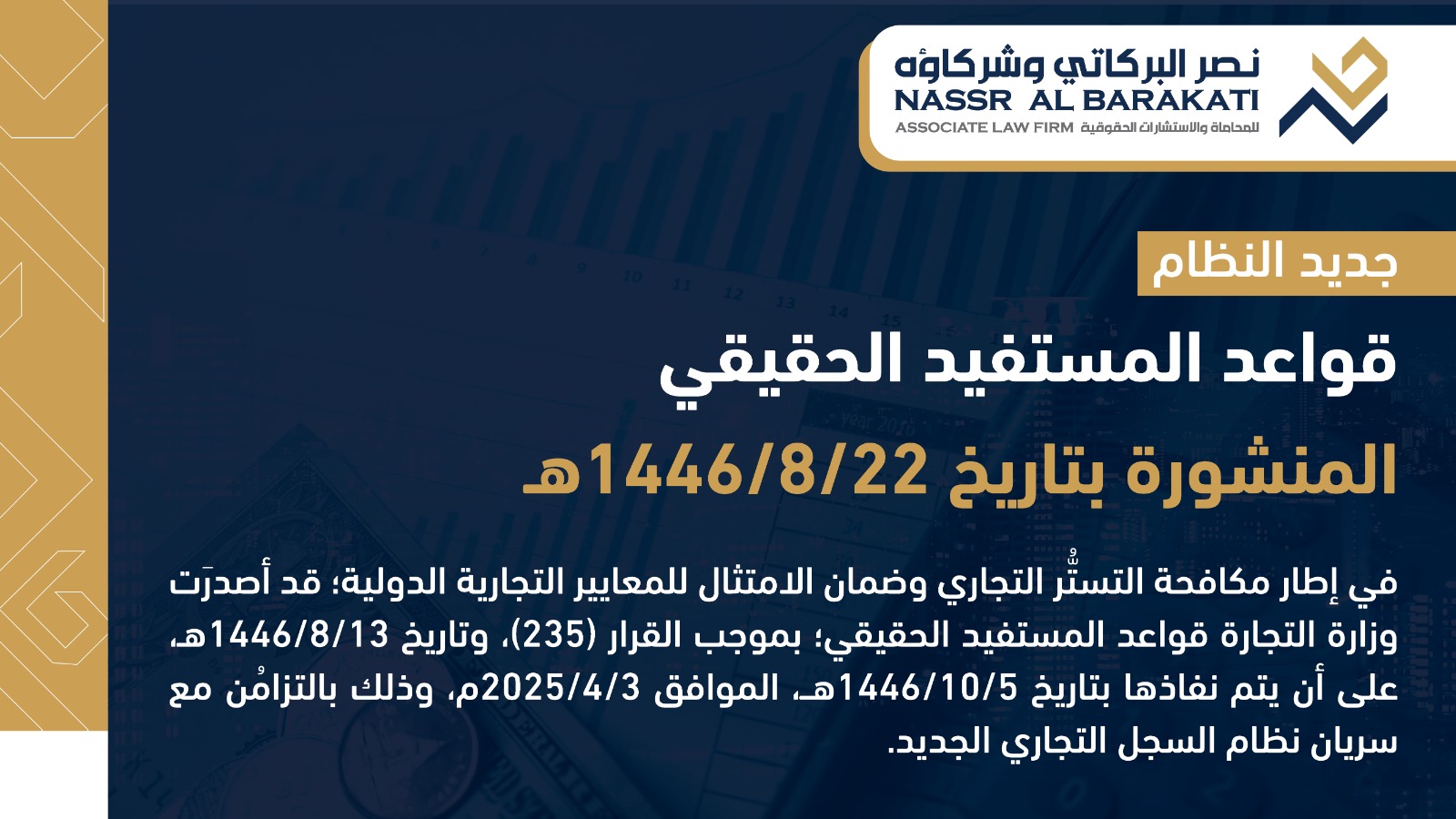
Real Estate Ownership System for Non-Saudis
تماشيًا مع النمو الاقتصادي والمتسارِع الذي تشهدهُ المملكة العربية السعودية في الآونة الأخيرة صدرَ النظام المُحدَّث لتملُّك غير السعوديين للعقار، الذي يُنظِّم حقوق الملكية العقارية للأفراد والشركات. يسهم هذا النظام المحدَّث في تنمية الاستثمار العقاري، ودعم التنمية الوطنية، حيثُ سيكُون نافذًا مطلَع العام المقبل 2026م.
See More
اللائحة التنفيذية لضبط أعمال تفتيش العمل وتنظيمها
تلعَب أعمال تفتيش العمل دورًا حيويًّا في ضبط بيئة العمل وتعزيز التزام المنشآت بالقوانين واللوائح المنظمة. صدرت اللائحة؛ بموجب قرار وزير الموارد البشرية والتنمية الاجتماعية رقم (120279) وتاريخ 28/08/1446هـ، وتُمثِّل أداة فعّالة تُمكّن وزارة الموارد البشرية والتنمية الاجتماعية من متابعة تطبيق نظام العمل بشكلٍ فعّال، بما يضْمَن حماية حقوق العاملين، وإليكُم أبرز التفاصيل والأحكام التي تناولتْهَا هذهِ اللائحة:
See More
اللائحة التنفيذية لنظام ضريبة التصرفات العقارية
تُمثِّل ضريبة التصرفات العقارية أحد الأدوات المالية الهامة لتنظيم سوق العقار، وزيادة إيرادات الدولة في المملكة العربية السعودية، وقد صدرت اللائحة التنفيذية لنظام ضريبة التصرفات العقارية بموجبِ قرار مجلس إدارة هيئة الزكاة والضريبة والجمارك برقم (01-03-25)، وتاريخ 24/9/1446 هـ، بهدفِ توضيح الإجراءات والضوابط الخاصَّة بتطبيق النظام، وتهدُف هذه اللائحة إلى تحقيق الشفافية، ومنع التهرُّب الضريبي، وضمان العدالة في معاملات التصرفات العقارية، وإليكُم أبرز التفاصيل والأحكام التي تناولتْهَا اللائحة:المحور الأول: التعريفات:تضمَّنَت اللائحة عددًا من التعريفات التي تُعدُّ الأساس لفهم نظام ضريبة التصرفات العقارية، ومن أهمها:العقار: كلُّ منقول يضعه مالكه في عقارٍ رصدًا على خدمة العقار، أو استغلاله على سبيل الدوام، ولو لم يكُن متصلًا به اتصال قرار.الضريبة المستحقة: مبلغ الضريبة التي يجب سدادها حسب النظام واللائحة.الأوراق المالية: يكون لها المعنى المحدد وفقًا لنظامِ السوق المالية، والتي لها خصائص حقوق الملكية أو المساهمة، بما في ذلك على سبيل المثال لا الحصر الأسهم ووحدات الصناديق.الحِصص: ويقصد بها حقوق الملكية أو المساهمة في الممتلكات أو في شخص اعتباري أو أي نوع من أنواع الشراكة.الاستحواذ: ويقصد به العملية التي تتم عن طريق مبادلة حصص -بما في ذلك الأوراق المالية- وينتج عنها الاستحواذ على كامل حصص شركة عقارية، شريطة أن يكُون كل من المتصرِّف والمُتصرّف له أشخاصًا اعتباريين.المحور الثاني: فرض الضريبة: أوَضحَت المادة (الثانية) مجال تطبيق فرض الضريبة، وبيّنَت النسبة المفروضة على كل تصرُّف عقارِي؛ وَفق الاتي:
See More
اللائحة التنفيذية لنظام سلامة المنتجات
تعتبر سلامة المنتجات أهم العناصر الأساسية التي تسهُم في تعزيز جودة الحياة وحماية المستهلكين، ولذلك جاءت اللائحة التنفيذية لنظام سلامة المنتجات كإطار قانوني متكامل يهدُف إلى تنظيم السوق، وضمان التزام المشغِّلين الاقتصاديين بالمعايير والمواصفات المطلوبة، تمثل هذه اللائحة خطوة جوهرية نحو تعزيز الثقة بين المستهلكين والمنتجين، وتوفير بيئة تجارية آمنة وموثوقة، وإليكُم أبرز التفاصيل والأحكام التي تناولتْهَا هذهِ اللائحة:
See More
Organization of the Saudi Investment Marketing Authority
في إطار سعي المملكة العربية السعودية لتحقيق رؤية 2030 التي تهدف إلى تنويع الاقتصاد برُزَت الحاجة إلى تعزيز بيئة الاستثمار وجعل المملكة وجهة جاذبة للمستثمرين المحليين والدوليين، ومن هنا، تأتي أهمية "تنظيم الهيئة السعودية لتسويق الاستثمار"، والتي تُعدُّ إحدى الركائز الأساسية في بناء نظام استثماري متكامل وفعَّال، وإليكُم أبرز تفاصيل هذا التنظيم:
See More
The regulatory framework for temporary work visas and temporary work for Hajj and Umrah services
تُولي المملكة العربية السعودية اهتمامًا كبيرًا بتنظيم سوق العمل، خاصةً في المواسم التي تشهد زيادة الطلب على العمالة المؤقتة، مثل مواسم الحج والعمرة. ولذلك جاءت اللائحة التنظيمية لتأشيرات العمل المؤقت وخدمات الحج والعمرة كأداة تنظيمية؛ لضمان استقدام العمالة المناسبة، وَفق اشتراطات مهنية دقيقة، بما يسهم في تحسين الخدمات المقدمة، مع الحفاظ على حقوق جميع الأطراف المعنية، وفيما يلي أبرز أحكام اللائحة:
See More
The executive regulations of the Personal Status Law
تُعد الأحوال الشخصية من أهم مجالات التشريع التي تعنِي بتنظيم شؤون الأسرة باعتبارها النواة الأساسية للمجتمع؛ ومن هذا المنطلق جاءت اللائحة التنفيذية لنظام الأحوال الشخصية؛ بموجب برقية تعميمية رقم (59641) وتاريخ 17/8/1446هـ؛ لتوضيح الأحكام والإجراءات المتعلقة بشؤون الزواج، والحقوق الأسرية، والنفقة، والحضانة، والوصاية، وغيرها من مسائل الأحوال الشخصية ذات الصلة. تهدُف اللائحة إلى وضع الضوابط الكفِيلَة لحماية الحقوق، وضمان مصلحة الأطراف، ونبسِّط لكُم أبرز ما جاء في اللائحة في السطور التالية:
See More
Beneficial Owner Rules
في إطار مكافحة التستُّر التجاري وضمان الامتثال للمعايير التجارية الدولية؛ قد أصدرَت وزارة التجارة قواعد المستفيد الحقيقي؛ بموجب القرار (235)، وتاريخ 13/8/1446هـ، على أن يتم نفاذها بتاريخ 5/10/1446هـ، الموافق 3/4/2025م، وذلك بالتزامُن مع سريان نظام السجل التجاري الجديد، وإليكُم أبرز تفاصيل هذه القواعد:
See More
Approval of the introduction of the Golden Handshake Program and the internal announcement of vacant government positions through the electronic system of the Ministry of Human Resources and Social Development.
في إطار سعي المملكة إلى تعزيز كفاءة سوق العمل في القطاع العام، وتحقيق الاستخدام الأمثل للموارد البشرية، صدر هذا القرار ليضع تنظيمات دقيقة تهدُف تحسين إجراءات التوظيف وشغل الوظائف الشاغرة بكفاءة وشفافية، مع دعم آليات الإعارة والتوظيف الجزئي، وإلغاء الوظائف غير المستغلة، كما يتضمن القرار استحداث برنامج "المصافحة الذهبية" كإجراء تحفيزي للخروج الطوعي من الخدمة، بما يسهم في تحقيق التوازن الوظيفي، وتخفيض التكاليف التشغيلية؛ وَفق ضوابط محددة تضمن العدالة والفاعلية، ونبسطها لكم في الآتي:
See More
Rules for conducting financial settlements with those who committed corruption crimes, whether natural or legal persons.
في إطار الجهود المستمرة لتعزيز النزاهة ومكافحة الفساد؛ وضمان استرداد الأموال العامة التي تم الاستيلاء عليها بطرق غير مشروعة، اعتمدت قواعد تنظيمية لإجراء التسويات المالية مع الأشخاص الطبيعيين والاعتباريين الذين ارتكبوا جرائم فساد؛ وتأتي هذه القواعد ضمن نهج نظامي متوازن يحقق العدالة ويضمن المحاسبة، مع مراعاة التحفيز والتشجيع لمن يبادر بالإفصاح، بالتسوية وفق ضوابط محددة؛ وفيما يلي نُبسط لكم هذه القواعد:
See More
Ensuring legal compliance for company meeting agendas: steps and best practices
تعتبر الاجتماعات أحد العناصر الأساسية في إدارة أي شركة، وخاصة في مجال الاستشارات القانونية حيث تتطلب الأمور القانونية الدقة والالتزام بالقوانين واللوائح، لضمان الامتثال القانوني للشركات لجداول أعمال الاجتماعات، يجب اتباع خطوات محددة وتطبيق أفضل الممارسات، سوف نتعرف عليها فى هذا المقال
See More
The regulation for the transfer of personal data outside the Kingdom
تُعدُّ حماية البيانات الشخصية أحد أبرز التحدِّيات التي تواجه الدول في هذا العصر، ولذلك؛ أصدرت المملكة العربية السعودية مؤخَّرًا لائحة نقل البيانات الشخصية إلى خارج المملكة بتاريخ 28/2/1446هـ، الموافق 1/9/2024م، بناءً على قرار رئيس الهيئة السعودية للبيانات والذكاء الاصطناعي رقم (1840). تهدُف اللائحة إلى تعزيز الحماية القانونية للبيانات الشخصية، وضمان استخدامها بطريقةٍ تراعي الخصوصية والأمان عند نقلها، أو الإفصاح عنها خارج الحدود، مع مراعاة التوازن بين تسهيل تدفُّق البيانات عالميًّا وحماية حقوق الأفراد.
See More
Rules for Selling Customs Goods by Auction
تعتبر المزادات العلنية وسيلة فعّالة لبيع الأصول،وتحديد قيمتها السوقية؛ حيث تعكس قيمتها الحقيقية بناء على العرض والطلب. تسهمالقواعد القانونية في تعزيز الشفافية والعدالة في هذه العمليات من خلال تنظيم كافةجوانب المزاد، بدءًا من الإعلان عنه وصولًا إلى تسليم الأصول. إن تطبيق قواعدواضحة يعمل على تقليل المخاطر المرتبطة بالفساد، مما يعزز الثقة لدى المشاركينويدعم الاقتصاد الوطني بشكل عام.صدر نظام الجمارك الموحّد لدول مجلس التعاون الدول الخليج العربية؛ بموجب المرسوم الملكي رقم (م/41) وتاريخ 3/11/ 1423هـ، والذي يهدُف إلى توحيد الإجراءات الجمركية في دول مجلس التعاون، وقد عالج النظام موضوع التصرُّف بالبضائع الجمركية؛ بقيام الإدارة بالبيع بالمزاد في المادة (170)، حيث تَم تفويض الوزير أو الجهة المختصة بإصدار الشروط والقواعد ذات الصلة، ومن ثَم أصدرت إدارة هيئة الزكاة والضريبة والجمارك تلكَ القواعد. تتضمن القواعد الأساسية للعرض بالمزاد العلني متطلبات متعددة، ومنها ضرورة التسجيل المسبق للمتزايدين وتقديم الضمانات المالية؛ حيث تنص المادة التاسعة فقرة (3) على أنَّه: "يسمح للأشخاص الطبيعيين أو الاعتباريين الدخول إلى المزاد العلني وفقا للاشتراطات التالية: "يجب التسجيل المسبق لدى الهيئة وفقاً لما تحدده بالإعلان"، وهذا يضمن أن كل المشاركين في المزاد مؤهلون، ويملكون القدرة المالية على الوفاء بالتزاماتهم.
See More
the Executive Regulations for the Public Facilities Protection System
تُعدُّ المرافق العامة إحدى أهم الركائز الأساسية التي تقوم عليها المجتمعات الحديثة، فهي تسهم في توفير الخدمات الحيوية التي لا غنى عنها، مثل الطرق، الجسور، شبكات تصريف السيول وغيرها، ومع ازدياد استخدام هذه المرافق، أصبحَ من الضروري وضع قواعد لحمايتها من التعدي عليها. واستجابةً لذلك، أصدر وزير البلديات والإسكان قرارًا برقمِ (4600108324) بتاريخ 15/5/1446هـ، تضمَّنَ الموافقة على القواعد التنفيذية لنظام حماية المرافق العامة؛ لتنظيم استخدامها، وحمايتها، وتقليل التلفيات، وفيما يلِي أبرز هذه القواعد:
See More
How the Liquidator Contributes to Organizing the Liquidation Process of Companies in the Saudi System
تعتبر عملية تصفية الشركات من العمليات الحساسة التي تتطلب تنظيمًا دقيقًا وإشرافًا قانونيًا، يلعب المصفي دورًا محوريًا في هذه العملية، حيث يتحمل مسؤولية إدارة وتسوية شؤون الشركة المنحلة، في هذا المقال، سنتناول دور المصفي في تنظيم عملية تصفية الشركات في النظام السعودي، مع التركيز على دراسة حالة شركة نصر للاستشارات القانونية كمثال عملي.
See More
Latest technology commercial registration and names system
في المملكة العربية السعودية، شهد نظاما "السجل التجاري" و"الأسماء التجارية" تحديثات جوهرية غيرت قواعد اللعبة بالكامل. من إزالة العقبات القديمة إلى تقديم حلول مرنة تُسهل على رواد الأعمال والمستثمرين، هذه التغييرات لم تأتِ فقط لتبسيط الإجراءات، بل لتُمهد الطريق نحو مستقبل أكثر شفافية وابتكارًا.في هذا المقال، سنتعرف على أبرز التحسينات التي طرأت على هذين النظامين، وكيف تساهم في خلق بيئة تجارية أكثر جاذبية للمستثمرين المحليين والدولييناستعد لاكتشاف كيف يعيد النظام القانوني في المملكة رسم خارطة النجاح لرواد الأعمال، وتعرّف على الحلول التي تُمكّنك من استغلال هذه التغييرات لصالحك!في المملكة العربية السعودية، يشكل النظام القانوني عمادًا رئيسيًا لتطوير قطاع الأعمال، ومع التطور المستمر، بات من الضروري تحديث بعض الأنظمة بما يتناسب مع طموحات رؤية المملكة 2030. اثنان من هذه الأنظمة هما "السجل التجاري" و"الأسماء التجارية" واللذان شهدا تطورات هامة لتحقيق بيئة أكثر شفافية وموثوقية.
See More
value added tax
"دليل التاجر الشامل: كل ما تحتاج معرفته عن ضريبة القيمة المضافة في السعوديةتعتبر ضريبة القيمة المضافة في السعودية جزءًا لا يتجزأ من النظام الضريبي في المملكة ، فهي تساهم في تنويع مصادر الدخل الحكومي وتحفيز النمو الاقتصادي، ومع ذلك، قد تبدو متاهات ضريبة القيمة المضافة معقدة بالنسبة للكثير من التجار، لذلك، يهدف هذا الدليل الشامل إلى تبسيط المفاهيم الأساسية لضريبة القيمة المضافة وتزويد التجار بكافة المعلومات الضرورية لضمان الامتثال للأنظمة واللوائح ذات الصلة
See More
Legal guide in labor relations
تعد علاقة العمل من أهم العلاقات الاجتماعية والاقتصادية، وهي تخضع لقوانين وأنظمة تحكمها وتنظمها، وف سياق هذه العلاقة، تبرز أهمية حماية حقوق العمال في السعودية، خاصة في الحالات التي تشهد تغيرات هيكلية في المنشآت، مثل الإفلاس أو نقل الملكية.
See More
Professional legal management
تُعتبر الإدارة القانونية في الشركات حجر الزاوية في أي منشأة، فهي تعمل كدرع واقٍ يحميها من المخاطر القانونية، ويعزز من كفاءتها التشغيلية، تلعب هذه الإدارة دورًا حيويًا في ضمان الامتثال للقوانين واللوائح، وتقديم الاستشارات القانونية اللازمة لاتخاذ القرارات الاستراتيجية، وحل النزاعات التي قد تنشأ.
See More
Supply contracts
قطاع التوريد هو مجال معقد يتطلب فهماً عميقاً للعمليات التجارية والقوانين ذات الصلة، لضمان نجاحك في هذا المجال، تقدم لك مجموعة من النصائح القانونية القيمة التي يمكن أن تساعدك في النجاح في قطاع التوريد وتجنب الوقوع في أي مخاطر قانونية.
See More
Key steps to maintaining legal compliance
درع الحماية ضد المخاطر القانونية في الشركاتتُعتبر الإدارة القانونية بمثابة الدرع الواقي الذي يحمي من المخاطر القانونية في الشركات المتوقعة وغير المتوقعة، فهي تعمل كشريك استراتيجي أساسي، تساهم في تحقيق أهداف الشركة من خلال ضمان الامتثال للقوانين واللوائح، وحماية حقوق الملكية الفكرية، وتسوية النزاعات القانونية بفعالية.
See More
The most important provisions of the executive regulations for the specifications and quality system
تُعَد المواصفات والجودة العالية عوامل حيوية في تحسين الأداء الاقتصادي وتعزيز التنافسية للمنتجات والخدمات. وفي هذا السياق، اعتمد وزير التجارة، معالي الدكتور ماجد بن عبد الله القصبي، اللائحة التنفيذية لنظام المواصفات والجودة بهدف تعزيز التنافسية والجودة بما يتماشى مع رؤية المملكة 2030. تُعرّف اللائحة كوثيقة تحدد القواعد والخصائص للمنتجات، في حين تشير علامة الجودة إلى أن المنتج يحقق متطلبات فنية تفوق المواصفات المعتمدة.
See More
Legal Services in Real Estate: Protecting Your Investments and Achieving Success
Legal services in the real estate sector are a crucial and important element in protecting real estate investments and ensuring success in this vital sector, allowing projects to continue smoothly. Whether you are an investor or a real estate development project owner, understanding the legal aspects related to real estate is key to ensuring your projects run smoothly and protecting them from potential risks. In the ever-changing and growing real estate investment environment, legal services help you avoid loopholes that could hinder your future work and limit your development. Whether you are a novice investor or a large real estate project owner, a deep understanding of legal aspects can be the difference between success and failure.Protecting investments from legal risks When investing in real estate, it's not just about buying a property or developing a project; it's essential to understand the laws and regulations governing this field. This is where the importance of legal consultations comes in, providing comprehensive protection for investors' rights. Legal consultation ensures that all contracts are signed in a way that protects the rights of all parties, whether they are purchase, lease, or development contracts. It also ensures that these contracts comply with local and international laws, preventing any future legal issues. For instance, an investor might face legal risks if it turns out that the property deed is incorrect or contains legal issues. This is where the role of the lawyer becomes critical, examining property deeds and verifying their validity to ensure the investor makes a legally sound transaction.Resolving real estate disputes quickly and efficiently Real estate disputes are an integral part of the real estate world, whether related to property expropriation, boundary encroachments, or disputes over lease contracts. These disputes can lead to project delays and cause investors significant financial losses. Hence, legal consultations are a proactive step to address these issues before they escalate. Lawyers can offer quick solutions such as arbitration and mediation, which are alternative dispute resolution methods that don't require going to court. Arbitration provides a more flexible and faster environment to address issues, allowing both parties to reach an amicable solution while maintaining business relations. If matters escalate and court intervention is needed, having a lawyer to provide full support and represent the investor in court ensures professional defense of their rights.Supporting sustainable growth for real estate projects Legal consultation is not just about solving problems and disputes; it plays a vital role in supporting the sustainable growth of real estate projects. This support can be manifested through good legal planning that sets the project on the right path from the start, helping to avoid future obstacles. Lawyers assist investors in strategically planning their projects, offering advice on how to establish a legal framework for the project that can handle any changes in laws or markets. For example, if an investor wants to expand their project into a new area or start an international project, the lawyer can guide them regarding international real estate laws in that region, ensuring compliance with local and international regulations.Negotiating and drafting contracts professionally Negotiating and drafting contracts in a precise legal manner is critical in real estate, whether you're about to sign a new property purchase contract or preparing a long-term lease agreement. Having a lawyer ensures that the terms are fair and protect your interests. Legal consultations provide investors with in-depth legal insight on how to structure contract terms in compliance with the law while protecting their long-term interests. For instance, in real estate development cases, contracts can be complex and require clear clauses defining each party's responsibilities and delivery stages. A lawyer contributes to drafting these contracts in a way that ensures transparency and alignment between all parties, protecting the project from delays or unexpected costs.Guiding investors in sales and leasing procedures Additionally, lawyers play a crucial role in guiding investors on how to manage their properties, whether they want to sell, lease, or even develop them for new projects. This guidance ensures that all procedures are carried out legally, protecting the rights of the parties and ensuring the precise implementation of contract terms. For instance, when leasing a property, a lawyer can draft lease contracts that clearly protect the rights of both the landlord and the tenant. They can also provide advice on tax planning to ensure compliance with real estate-related tax laws and avoid any violations that could result in fines.In conclusion, obtaining specialized legal consultation is an investment that ensures the protection of real estate projects and increases their chances of success. Through legal consultation, investors can benefit from the deep expertise and knowledge of laws we have at Nasser Al Barakati & Partners Law Firm and Legal Consultancy, helping them make better strategic decisions and avoid legal problems before they occur. In the real estate investment environment, legal consultation can be the critical factor contributing to achieving your goals with confidence and sustainability.
See More
From Establishment to Rights Protection: How Legal Support Contributes to Aligning Companies with Vision 2030
Establishing Your Company: The First Step Towards SuccessEstablishing your company is the first step towards success and the foundation that must be solid enough to withstand the winds of change and market fluctuations. Therefore, it requires significant attention, especially from the legal perspective, to ensure that you protect your rights and avoid risks. Accordingly, obtaining legal advice at this stage is not just a traditional obligation but an integral part of the strategic planning for the company’s growth and alignment with the Kingdom's Vision 2030. This ambitious vision demands companies to adhere to high standards of innovation and transparency, making precise legal protection essential to cover all aspects of the business — from drafting well-structured commercial contracts to handling potential legal disputes.The Importance of the Business Formation Stage and Protecting RightsThe business formation stage is not merely administrative procedures; it is a critical process that lays the groundwork and determines the future path of your company. With accurate legal advice, companies can achieve balanced commercial contracts and clarify the responsibilities of all parties. Furthermore, intellectual property protection ensures that startups can safeguard their innovations and rights from exploitation or theft.Do not think that intellectual rights are just legal terms; they are strategic assets that support the company’s growth. Therefore, your investment in legally protecting these assets enhances your company’s ability to continue innovating and competing in the market without issues or obstacles.The importance of sound legal establishment goes beyond merely preparing documents and registration. Many legal aspects may be overlooked by new founders, such as determining ownership structure, carefully drafting foundational contracts, and defining partner responsibilities. Neglecting these aspects could lead to future legal problems that affect the company’s continuity. Thus, obtaining specialized legal advice is essential to ensure all details are covered in a sound legal framework, protecting your rights and ensuring establishment according to the highest legal standards.The Importance of Corporate Representation in Disputes and ArbitrationBusiness disputes are inevitable, but how they are handled will determine their impact on the company's operations. This is where the importance of arbitration and mediation lies, offering faster and more efficient dispute resolution compared to traditional litigation. Moreover, corporate representation in these situations ensures the protection of legal interests and avoids concessions that could negatively affect business operations.Arbitration not only helps resolve disputes but also manages commercial relationships, ensuring the continuity of cooperation with partners and suppliers. Thus, companies with a strong legal team can manage their disputes successfully, emerging stronger and more stable.Legal Consultation: A Key Element in Corporate SuccessLegal consultation is not an additional service but an integral part of any successful development plan. Whether it concerns dispute management or contract amendments, obtaining corporate legal advice contributes to informed strategic decision-making, positively reflecting on both financial and administrative performance. In the end, legal support remains one of the main pillars that companies rely on to achieve sustainable success in a constantly changing and complex business environment.
See More
Have you ever asked what is Legal Departments and how they help corporates?
According to a 2020 Harvard Business Review statistic, American companies incur losses exceeding $20 million due to settlements and legal issues arising from the absence of an internal legal department and the lack of external legal counsel for contract management and internal business regulation. Hence, the presence of a legal management team in any company is paramount. It plays a vital role in decision-making processes by executives and offers valuable consultation to various departments. Therefore, a successful legal department significantly enhances the protection of the company's and its partners' interests, proving essential for corporate stability.The question arises about the types and roles of legal departments in commercial companies.
See More
The Role of Preventive Settlement .. From A to Z
Preventive settlement stands as the foremost measure among bankruptcy procedures, offering significant benefits to debtors. It facilitates reaching an agreement with creditors to settle debts while retaining control over business operations. This procedure's importance merits a detailed exploration of its implementation steps.
See More
Beware of collecting credit information before understanding its most important regulations!
Credit information is the consumer’s data regarding his credit transactions, such as: loans, purchase in installments, rent, deferred sale, credit cards, and the extent of his commitment to pay or not. Requirement to obtain a license to provide credit information It is prohibited for any natural or legal person to provide credit information activity before obtaining a license from the Saudi Arabian Monetary Agency, provided that the company that is licensed to provide credit information requires the following: ● To be a joint stock company within the Kingdom. ● Its paid-up capital shall not be less than (50) million riyals. ● The approval of the Saudi Arabian Monetary Agency on the company's articles of incorporation and articles of association. ● The approval of the Saudi Arabian Monetary Agency for the credit information system. ● Availability of qualified human resources, financial and operational resources to carry out work efficiently and effectively. ● Undertaking to abide by any instructions issued by the institution.
See More
Preventive Settlement: Your Path to Avoiding Bankruptcy!
The preventive settlement is the first procedure of bankruptcy procedures, and it is a procedure that gives the debtor a great advantage, as it facilitates for him to reach an agreement with his creditors to settle their debts while retaining the management of his activity, and given the importance of this procedure, we will follow in these lines the steps of its implementation until finalizing it.The debtor begins the first step by preparing to submit a request to open the preventive settlement, where he can prepare to submit a request to open the preventive settlement by following a number of steps, starting by viewing the guide for opening bankruptcy procedures from the website of the Bankruptcy Committee, by clicking on the following link: (https://bankruptcy .gov.sa/ar/Pages/default.aspx), then study the various bankruptcy procedures, choose the most appropriate procedure, and then proceed to preparing the proposal and collecting the necessary information and documents, to submit the application, it is also required to add to the proposal an overview of the debtor's financial position, the effects of the economic situation on it, the classification of creditors, and obtaining the approval of the bankruptcy trustee for this proposal.There is an approved mechanism for submitting a request to open a preventive settlement that begins with the request submitted by the debtor to open the procedure to the court, accompanied by the proposal indicated by the trustee and the relevant information and documents. The debtor also is entitled to ask the court - upon requesting the opening of the settlement - to adjourn the claims, and the court may adjourn the claims for a period not exceeding (90) days from the date of the opening of the procedure, and it may extend this period for (30) days for one or more times upon the request of the debtor, at the period of adjournment of claims shall not exceed (180) days, and the debtor is obligated to inform his creditors of the court's injunction to adjourn the claims immediately upon its issuance.The debtor has the right to request the court to terminate any contract to which he is a party, attached to his request a report prepared by the trustee in bankruptcy stating the reason for terminating this contract.However, it should be noted that the debtor may not apply for the opening of the preventive settlement procedures if he has previously been subject to this procedure or to the preventive settlement procedure for small debtors during the (12) months preceding the opening request.After learning how to submit the application for opening, it is worthwhile for us to learn about the mechanism for opening the preventive settlement procedure, which begins with the court setting a date to consider the application for opening the preventive settlement procedure within a period not exceeding (40) days from the date of registration of the application, then the court issues a ruling to open the procedure It sets a date for the creditors to vote on the proposal, in the hearing of the opening request, after which the debtor informs the creditors specified in the proposal of the court’s ruling of opening the procedure within (7) days from the date of its issuance, and invites them to vote on the proposal, provided that a copy of the notification is attached to the notification. proposed, and the court has the right to adjourn the hearing for a period not exceeding (21) days, to provide any additional information or document, or to amend the creditors' classification.After the inauguration of the settlement procedure, the steps for adopting the preventive settlement proposal emerge, which begins with the owners - whose rights are affected by the proposal - casting their votes on the proposal, whether approving or rejecting it. After that, the debtor informs the creditors and owners of the result of the vote and deposits it with the court, at which point any of the creditors has the right to submit a request to include his claim that was not included in the proposal.In the meantime, the debtor shall ask the court to ratify the proposal and shall inform the creditors before that.Finally, the debtor informs the creditors of the court's approval of the proposal, and then deposits a copy of the court's approval of the proposal in the bankruptcy register within (5) days from the date of its approval.• If anything appears that requires amending the proposal; The debtor may submit a request to the court to approve the amendment of the proposal, and he shall notify the creditors of this, and the date for voting on it shall be fixed within (5) days from the date of the court’s approval.• As for the next stage, it is the implementation stage, where the proposed debtor is implemented, approved by the court, and the creditors and owners are committed to it.• As for the last stage, which is the termination of the procedure, whereby the debtor informs the creditors before submitting a request to terminate the procedure; In order to complete the implementation of the proposal, then any interested party has the right to object to this request within (14) days from the date of submission of the request by the debtor. The court shall decide to terminate the procedure when one of the cases is achieved that the debtor submits a request to the court to terminate the procedures to complete the implementation of the proposal, or the required quorum is not achieved in the voting of the owners or creditors on the proposal, or the owners or creditors cannot vote on it on the specified date, as well as if it is not specified the Court another date for the vote, and in the event that the Court refuses to endorse the proposal, or the debtor applies for an end to the proceeding; because the conditions for opening the proceeding no longer apply to him, or the debtor or creditor submits a request to terminate the proceeding; because the proposal cannot be implemented, or the debtor has applied to terminate the proceeding; For his lack of desire to continue managing his activity or to complete the implementation of the proposal, or for an interested party to submit a request to terminate the procedure due to the presence of effective violations during the procedure, or because the debtor has committed one of the criminal acts by law.Finally, the debtor shall deposit the judgment ending the procedure in the bankruptcy register within a period not exceeding (5) days.Thus, the preventive settlement provided an excellent solution for the debtor, enabling him to pay his debts without declaring his bankruptcy and losing the ability to manage his activity. From this point of view, it was necessary to define it and clarify the mechanisms for its implementation and steps for its implementation and termination.
See More
9 Ways to Build Strong Client Relationship
9 Ways to Build Strong Client Relationship Here’s a solid-gold law marketing tip: stop handling cases and start building relationships. It can mean the difference between having a job and launching a career. A case is a linear event. It has a beginning, a middle and an end. Along the way, you do some work and get paid for it. A relationship, by contrast, is a living thing. It is brought into existence by two or more people, and it lasts as long as its creators want it to. You can make money on cases. But you build a career – a long, profitable and pleasurable one – on relationships. “There’s more to building a business than buying a few online ads and praying for clients,” says Clio Law. “You’ll need to spend time building relationships, while also keeping existing clients happy to ensure repeat business—all of which can be more difficult than it sounds.”
See More
What is the difference between a privacy policy and terms and conditions? And when do you refer to each?
When you are launching a startup, you need to take a lot of steps to make sure that you successfully get your business off the ground and set it on a path that will bring you profit and help you meet the needs of your future customers.One of the most important steps to take when launching a website or a mobile app is creating terms and conditions and privacy policy agreements.These legal agreements are incredibly valuable for both you and your customers, because not only do they inform people about everything that they are agreeing to when they start using your services, but they also protect your company against legal claims.However, many websites and mobile app owners don't quite realize the difference between terms and conditions and privacy policy agreements and they don't really know how to draft them, so they end up making their business vulnerable. Since they have different purposes, you need to make sure that you fully understand what each of them is and why you really need them, so read on
See More
7 skills for a successful law career
The competition to secure a job in the legal sector is known to be intense. In order to become a successful lawyer; You need seven important skills
See More
A Complete Guide for Customs Clearance Process
In today's interconnected world, every nation boasts ports of entry for goods, whether through air, sea, or land. These goods undergo inspection upon entry and are subject to customs duties, a fee imposed on all goods and shipments. The owner or agent of the goods must navigate the customs clearance process, which involves submitting the required documents to facilitate export and import operations. This responsibility includes overseeing the goods during inspection and valuation, paying the necessary fees, and receiving the goods upon completion of the process. The Gulf Cooperation Council's Unified Customs System dedicates its entire sixth section to outlining the stages of customs clearance, which include:
See More
Seasonal Employment Contract: Learn about it and its most important terms.
The significance of seasonal employment contracts in Saudi Arabia is closely tied to the Hajj pilgrimage, necessitating the issuance of a vast number of seasonal work visas annually. Consequently, a specific regulation has been dedicated to govern these contracts, in addition to certain provisions outlined in the Saudi Labor Law. Given the unique nature of seasonal work contracts, they are not subjected to all the labor law rules but have tailored provisions that align with their specific requirements. The Ministry of Labor and Social Development gears up for the Hajj season by launching the "Tamam Al-Hajj" program. This initiative aims to monitor seasonal workers, ensuring their adherence to their designated roles, sharing information about companies and institutions whose recruits fail to comply, and addressing violations related to the sale of seasonal work visas. These efforts are in line with the regulatory framework for temporary and seasonal work visas established by Cabinet Decision No. 497 dated 16/11/1436 AH.
See More
Performance Orders .. Easy way to Claim Debts
Certain commercial debts, undeniably established in writing, often conclude with default judgments against debtors who deliberately avoid attending court sessions to stall proceedings. To address this issue, Saudi regulatory bodies have introduced a solution allowing creditors to swiftly secure their written commercial debts. This solution involves simplified procedures to obtain a court order from the competent commercial court to fulfill the debt after submitting the written evidence. This court order, known as a "Performance Order," comes with accelerated enforcement, enabling immediate execution against the debtor.
See More
3 Critical Tax Installment Policies for VAT
Taxes play a significant role in the economic development of countries; they are a fundamental pillar of revenue that any country relies on to fund its facilities and projects, aiming to elevate its economy, which in turn benefits the state as a whole. Nations utilize the amounts collected from taxes—along with other sources of income—to spend on health, education, security, defense, and other essential facilities, as well as economic projects indispensable to any country. Given that the state's aim of imposing taxes is to enhance its economy rather than burden taxpayers with financial obligations, many countries consider the taxpayer's burden when legislating tax laws, offering the opportunity to pay taxes in installments. The Kingdom of Saudi Arabia has adopted this approach in its tax legislation, allowing for tax installment payments under specific conditions and requirements. If a taxpayer fulfills these, they have the right to request their due taxes to be paid in installments. The regulations and executive bylaws related to income tax and VAT in the Kingdom include provisions for tax installment payments as follows:
See More
What are Flexible Work Contracts? and how to create an account on the portal?
The contemporary labor market has seen the introduction of a novel work pattern known as the flex work system. This model aims to create a flexible work environment that enables all citizens to access suitable job opportunities. Flex work is characterized by part-time employment across one or more employers, with wages calculated on an hourly basis. It mandates that work hours for an employee at any given employer be less than half the total work hours at the establishment, allowing the worker to engage with numerous establishments provided there is no conflict of interest. The flex work contract is an electronic agreement documented through the Ministry's flex work portal.
See More
What do you know about Compensating Extra Work in Contract Projects?
In the realm of administrative and commercial contracting, project owners or management have the right to modify the scope of work executed by contractors based on the original agreement. This often includes expanding the contractor's obligations within certain guidelines. It's not uncommon for the need for additional, complementary work to arise—whether these tasks are specified in the contract or entirely new. Given the significance and potential complications arising from claims for additional work, this article delves into compensation for such work in contracting agreements and the legal foundation for compensation, addressing the following aspects:
See More
Is a job offer binding? And what is its importance in a successful hiring process?
The journey from an initial candidate's application to the final stage of assuming their new role involves several critical steps that significantly influence the success of the recruitment process. One such pivotal stage is the job offer presentation to the candidate, following their evaluation and deemed suitability for the vacant position by the management. Typically, the formal offer includes essential details about the new role, such as job title, department, direct supervisor, job nature (full-time or part-time), work hours and days, monthly salary, allowances, benefits, a brief description of job duties, the proposed start date, and the offer's validity period. The offer concludes with an acknowledgment for the candidate to sign if they accept the terms presented.
See More
What are The Challenges of Executing Commercial Contracts?
In commercial agreements, the fulfillment of obligations in a manner inconsistent with the contract's terms can entitle the aggrieved party to reject the contractual item and demand compensation. However, accepting the item without objection could waive this right, as it implies acceptance of any defects. For instance, a contractor's delay in project delivery without the client's formal objection could forfeit the client's right to claim damages. Therefore, issuing a formal notice upon any breach is crucial to safeguarding rights.
See More
Real Estate Ownership System for Non-Saudis
03 August 2025
تماشيًا مع النمو الاقتصادي والمتسارِع الذي تشهدهُ المملكة العربية السعودية في الآونة الأخيرة صدرَ النظام المُحدَّث لتملُّك غير السعوديين للعقار، الذي يُنظِّم حقوق الملكية العقارية للأفراد والشركات. يسهم هذا النظام المحدَّث في تنمية الاستثمار العقاري، ودعم التنمية الوطنية، حيثُ سيكُون نافذًا مطلَع العام المقبل 2026م.
See More